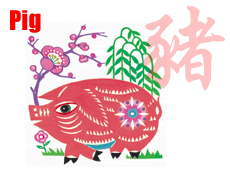Filipino Chinese New Year
SHARE THIS ARTICLE:Some areas are closed to traffic to pave way for its festivity. The celebration is accompanied by dragon and lion dancing, parade, musical performances & beauty pageant for Miss Chinatown, fireworks display, giving of ang pao (red packets of money), wearing red clothing for prosperity and a brighter future, and the distribution / giving of "tikoy" (sweet sticky rice cake) which symbolizes unity.

* A week before New Year's Eve, everyone is advised to engage in a spring cleaning, or "cleaning to the max." It's literally meant cleaning all the nooks and crannies in one's house.
* On New Year's Eve, all brooms, brushes, dusters, dustpans and other cleaning equipment must be wrapped in a red cloth, tied with a red ribbon and hidden away. No one is supposed to use them on New Year's Day to avoid conflicts and exchange of hurting words, and to refrain from sweeping away good fortune.
* Buy red things with Chinese characters because they bring good things like Chewroh-Pin'an and K'ng Huat for peace. Hang these in your house and you will get whatever you wish for.
* Display ponkan and oranges in homes and in stores. Tangerines are symbolic of good luck, and oranges are symbolic of wealth.
* Prepare wealth baskets. Get a small basket, lay a red cloth at the bottom of it and put one or two kilos of rice on the cloth. Next, get a red envelope (called Lai-See or Hong-Bao) and put money inside. If you wish to be really wealthy, put money of all denominations inside the envelop and place the envelop under the rice. Next, place the basket beside a mirror so that that bounty will be doubled by the mirror's reflection.
* After the New Year, cook the rice and eat this with all the family members to symbolize peace and unity. In case a family member is absent, an extra place should be set to symbolize the person's presence at the banquet.
* The money inside the envelop should not be spent but be deposited in the bank.
* All debts had to be paid on New Year's Day and nothing should be lent. Anyone who does so will be lending all the year.
* Everyone should refrain from using foul language and bad or unlucky words.
* No one is supposed to wash their hair on New Year's day because it would wash away good luck for the New Year.
* Do not use knives or scissors on New Year's Day as this may cut off fortune.
* Another tradition is the giving of the Red Packet (Lai-See or Hong-Bao) with money inside to unmarried couples. This is to wish them good luck in finding their future partners.
* Prepare something good for the kitchen god. By tradition, the kitchen god or Zaowang leaves the house on the night after the New Year to report to heaven on the behavior of the famiy throughout the year. To obtain a favorable report from the kitchen god, the family must give him a ritualistic farewell dinner with sweet foods and honey. Popular in the Philippines is the "tikoy", a sweet concoction made from sticky rice. Some said this is to bribe the kitchen god and
seal his lips from saying unpleasant things about the family.
Superstitions during the Chinese New Year period
The following is a list of beliefs that vary according to dialect groups / individuals.
*Buying a pair of shoes is considered bad luck. The word "shoes" is a homophone for the word for "rough" in Cantonese.
*Buying a pair of pants is considered bad luck. The word "pants" is a homophone for the word for "bitter" in Cantonese. (Although some perceive it to be positive as the word 'pants' in Cantonese could be a homophone for the word for "wealth".)
*A hair-cut is considered bad luck. The word "hair" is a homophone for the word for "prosperity". Thus "cutting hair" could be perceived as "cutting away your prosperity" in Cantonese.
*Candy is eaten to ensure the consumer a "sweet" year.
*Sweeping the floor is considered bad luck, as it will sweep away the good fortune and luck for the new year; in the same way that having a bath will wash away the good fortune.
*Talking about death is inappropriate for the first few days of Chinese New Year, as it is considered inauspicious as well.
*Buying books is bad luck, because it is a homonym to the word "lose".
*Opening windows and/or doors is considered to 'bring in' the good luck of the new year.
*Switching on the lights for the night is considered good luck to 'scare away' ghosts and spirits of misfortune that may compromise the luck and fortune of the new year.
Kung Hei Fat Choi!
 SHARE THIS!
SHARE THIS! 




















0 comments